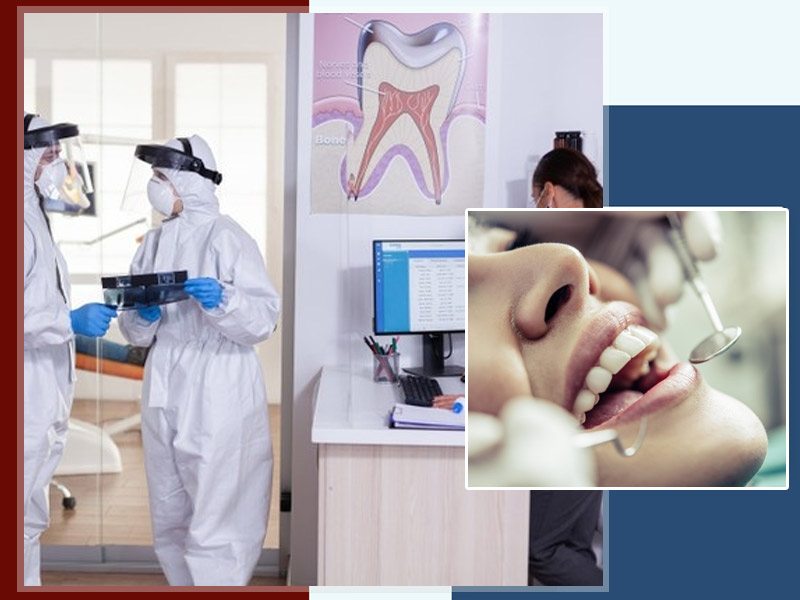
Charles Darwin once said in one of his most memorable works- "It is not the strongest of the species that survives, nor the most intelligent that survives. It is the one that is most adaptable to change that survives." Coronavirus disease 2019 (COVID-19), a new entity that brought a devastating pandemic affecting millions in a matter of few days by causing severe respiratory symptoms and death. This calamity affected mankind in total and compromised the delivery of health care services, including dental care. This virus put forward multiple challenges and the whole health care sector had to go for a revamp of the existing system and named it the New Normal. Read more about this revamped dental healthcare system in this article as shared by Dr. Nandita Shenoy, MDS Associate Professor, Oral Medicine and Radiology, Manipal College of Dental Science - MAHE, Mangalore.
Table of Content:-
Treating patients with dental needs along with preventing the spread of covid to dental patients and staff was a herculean task due to lack of knowledge and unpreparedness towards preventing contagion during treatments. Detecting COVID-19 itself was challenging in many routine cases due to the existence of patients who are infectious yet asymptomatic. The oral health care team is at high risk due to direct access to the initial site of entry for SARS-CoV-2 and aerosol-generating dental procedures.
3-Step Approach For Dental Treatment During Pandemic
Dental emergency services in the management of oral bleeding and space infection became vital in the time of the COVID-19 pandemic. Patients with severe dental pain who couldn't be managed with over-the-counter analgesics had to be treated on an emergency basis in a time of uncertainty having little knowledge about the disease process and its spread. A three-step approach was developed to standardize dental treatment in a hospital setup.

Step 1- Patient triage for screening purposes
Triage is a setup that is done to segregate patients on the basis of their treatment requirement. Due to COVID-19, hospitals are seeing an increased number of patients coming in for different treatments. Setting up a triage would help in managing patients and catering them as per the severity of their condition.
Also Read: Dental Treatment During Pandemic Is Safe If You Follow These Instructions
Dental hospitals or hospitals with dental health department are looking forward to setting up triage to screen patients are divide them into the following categories:
Urgent category- People put in this category are casualties that need immediate medical intervention. For example, someone walked in with unbearable tooth pain may need to see a doctor immediately. If found an infection in screening, they may be given painkillers to reduce the pain but they would be treated on a priority basis.

Delayed category- If you have come to get your regular dental checkup done, you would be placed in the delayed category. This means that your are placed after the urgent category patients since you do not need immediate medical aid and can wait patiently without any urgency.
Also Read: Debunking Dental Health Myths: 7 Things That We Believe But Aren’t True
Step 2- Minimizing the risk of virus transmission
Since the pandemic time is all about coronavirus transmission and the virus is here to stay for a long time, it is important to adapt a covid-protective approach. Keeping that in mind, dental care providers are focusing on grading the level of emergency and treat it in a manner to minimize risks of transmission and provide urgent care.
In this step, people with possible covid symptoms are also separated. This is to ensure minimum gathering at one place. This also includes ensuring all the covid-safety protocols are followed so that the risk of transmission is negligible.
Step 3- Educating patients on good oral care and delaying elective dental procedures.
This step is all about spreading awareness among the masses. As we all know, mouth serves as a potential gateway to the virus to enter the body. Good oral care minimizes the risk of covid virus entry. Also, this helps in managing dental hygiene to reduce the risk of dental problems for a long term.
Dental treatments are not necessary and can be stalled are termed as elective dental procedures. Doctors emphasize upon delaying such treatments in the wake of covid-19. You should try to keep them on hold for as much as possible.
The pandemic situation has given rise to the new-age dentistry. This is an adaptation to ensure patient safety and providing proper dental care. This 3-step approach is a great way that dental experts are adopting worldwide.
Image credits- freepik
Also watch this video
How we keep this article up to date:
We work with experts and keep a close eye on the latest in health and wellness. Whenever there is a new research or helpful information, we update our articles with accurate and useful advice.
Current Version